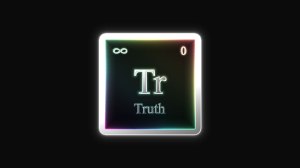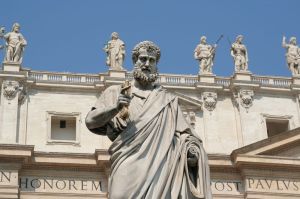I am so disappointed – why’d you become a Catholic?
I am sorry to disappoint you. But, to answer your question – I became a Catholic through the prayerful, rational pursuit of God’s truth. In the form of discovery, God reveals to those seeking Him that the fullness of truth fully subsists only in the Catholic Church.  My moral and spiritual integrity required me to follow His truth wherever it led – in this case, into the Catholic Church.
My moral and spiritual integrity required me to follow His truth wherever it led – in this case, into the Catholic Church.
Why do you use the phrase “the fullness of truth”?
The fullness of truth fully subsists exclusively in the one, holy, catholic, and apostolic Church. To my understanding, only the Catholic Church wholly fits those earmarks. In order to have a more deeply intimate relationship with Jesus Christ, I follow “truth.” One particular evening, I prayed and submitted to God that I would follow the truth, His truth, to wherever its greatest and fullest expression rested – wherever He led me; and that submission is still in action today.
What could possibly make you leave the Christian faith you learned and spent 20+ years of your life believing in?
In 1 Thessalonians 5:17, Paul says, “Test everything; retain what is good.” Jesus promised in Luke 11:10 that if we ask, seek, and knock that we will receive, find, and have the door opened. I always have, and will continue to desire, seek, and ask for greater intimacy with my Lord and Savior Jesus Christ – “how much more will the Father in heaven give the Holy Spirit to those who ask him?” In pursuit of greater intimacy, through the means of considerable research, reading, thought, reflection, prayer, adoration, learning and growing, God incrementally revealed Himself to me in profoundly greater and deeper ways. The Holy Spirit led me along the path of truth straight into the one Church Jesus Christ established – started in Matthew 16:18, and continuing undaunted by the gates of the netherworld all the way to today and beyond.
What do you mean by “reading” and “research”?
Put simply, I went back into Christian history to study, learn about, and reflect on the start of the Church – the roots of the faith we have today – the Apostles whom sat a Jesus’ feet, and the first warrior-Christians, many of which were martyred for their pure, unwavering faith. “So then you are no longer strangers and sojourners, but you are fellow citizens with the holy ones and members of the household of God, built upon the foundation of the apostles and prophets, with Christ Jesus himself as the capstone” (Ephesians 2:20).
The early Church Fathers – the men entrusted with the gospel, direct from the Apostles, selected, ordained, and specifically charged with teaching that faith to others (2 Timothy 2:2) – recorded the Christian faith, in its earliest, purest, simplest, and most-direct-from-Jesus practice. In numerous instances, that Early Church record of apostolic Christianity was distinctly different from what I was practicing and believed in as a Protestant.
Out of spiritual integrity it became imperative for me to pursue truth – time for me to test, time to ask/seek/knock, time to look for the Church with a clear apostolic foundation. Just a cursory look at the Protestant Church reveals this ubiquitous shortcoming in apostolic foundation.
Why are you so obsessed with truth?
As we both know very well – Jesus is the truth. He is not a truth, but the truth – the essence of truth. And no man comes to God the Father except through Him. I want to be immersed in Jesus, as such, I am immersed in truth. It doesn’t matter how nice what you believe is, how simple what you believe is, or how fundamental what you believe is – if it is not the absolute truth, it is garbage. “Truth or not-truth” is the ultimate deciding factor of my faith-choice, and should also be of yours.
So, what is “truth”? (John 18:38)
In 1 John 4:6, the “spirit of truth” does not belong to those who refuse to hear the Apostles [“hear” the Apostles, not necessarily just read]. In hearing the Apostles in the spirit of truth, Paul describes in 2 Thess. 2:15 precisely what from the Apostles we are to follow. “Therefore, brothers, stand firm and hold fast to the traditions that you were taught, either by an oral statement or by a letter of ours.” In 2 Timothy 2:2, Timothy was to take the teachings and traditions he heard from Paul and other witnesses, and in-turn entrust those oral teachings and traditions to others with the ability, specifically for the purpose of them teaching and passing it on to others.
As Christians today, we have the recorded scripture (written Apostolic teaching and tradition), we also have the writings of the early Church Fathers recording nearly all of the Christian traditions that the Apostles orally taught, which according to Paul, are equally authoritative, as well as formative in the Christian faith. Numerous passages the scriptures clearly declare both scripture and oral apostolic tradition passed down to and entrusted amongst the early Church Fathers as authoritative and as the truth.
The Catholic Church is false! I guess nobody has shared the real Gospel with you, may I?
Yes! Absolutely share the Gospel with me! I will follow the substantiated, verifiable truth. A few Protestants have shared their gospel with me – it was indisputably not the fullness of truth.
For instance, I have been told by one Protestant of 17 different areas that the Catholic Church supplanted the grace, glory, power, or salvation of Jesus Christ. I dealt with and totally refuted each one of these accusations through scripture, early Church history, apostolic teaching tradition, and reasoning. And never was there any additional comment, discussion in reply, or otherwise. The apostolic foundation of truth handily defeated every one of these false accusations. Please share the real gospel with me if it is the substantial, verifiable, apostolic truth.
I’ll even give you the answer to the test – if it doesn’t pass scripture, early Church history, apostolic teaching tradition, or reason: it is not the truth. Did early Church Fathers record your gospel as being handed to them by the Apostles (2 Tim. 2:2)? Or has your gospel been thought, taught, or recorded as being from the Apostles NOWHERE until the mid-1500, or even much later (Eph. 4:14)? Pick any “distinctively Catholic” topic, and run the check – confirm, which was taught by the Apostles?
Another example: a Protestant shared his gospel with me. Basing the truth of it upon the fact that “it was from God, and since God is truth, his gospel was truth;” even though this same gospel directly violated scripture, early Church tradition/history, the teaching and tradition the Apostles passed down to the early Church Fathers, and reason. What he preached was in no way verifiable as being from the Apostles, and thus was certifiably lacking truth and foundation. However, this Protestant was absolutely confident in the truth of his gospel, but yet would not even glance at the teaching and tradition that Apostles handed down to the early Church Fathers, much less prayerfully read, consider, or evaluate it. Maybe you have something more than this Protestant, who allegedly studied the Christian faith for 3 years, but somehow never once looked to the apostolic foundation of their teaching and tradition they handed down. Somehow he was still resolute in putting his faith in something totally ignorant of apostolic foundation, and that had shaky (if any) basis in scripture, Church history, and reason.
I am willing to follow the teaching and tradition of the Apostles, found in scripture, Church history, and reason, to the destination of the “fullness of truth.” I’ll will respectfully listen, and fact-check everything you say. If your real gospel passes as being taught by and passed down by the Apostles, I will follow it; if it fails the tests of scripture, Church history, apostolic foundation, or reason, will you then turn and seek the fullness of truth with me?
Does the Protestant Church have truth?
Nowhere else does the fullness of Christian gospel truth subsist – not in mainstream Protestantism, nor Non-Denominational Protestantism, not in the Baptist Church, nor the Methodist Church, not Mormon, Islamic, or Scientology churches, not even fully in the Orthodox Churches – history clearly shows that all of these Churches have split with the one, holy, catholic, and apostolic church. The Protestant Church has separated itself from, and does not have the fullness of truth. The Protestant Church is not one, it is not truly holy, it is not catholic, and it is demonstrably not apostolic.
Okay, are you saying that Protestantism a lie?
I am saying that because it does not follow all the Apostles handed down to the early Church – specifically the oral teaching tradition – according to 1 Jn. 4:6, Protestantism is the spirit of deceit and a trap (2 Tim. 2:26). There are many wonderful, beautiful, absolute truths that are within the Protestant Church, which are also shared by the Catholic Church. But, there are also severe twists of deceit within the Protestant Church that directly oppose apostolic teaching tradition carefully passed down and entrusted to the early Church Fathers, who were then charged with teaching it (2 Tim. 2:2). If you look for yourself, by way of apostolic teaching tradition, it will take you about 10 minutes to find any single disqualification of the Protestant Church as the fullness of truth, there are many. Are you convinced by the easily-confirmable truth, or are you trapped (2 Tim. 2:26) by the deceit of baseless “truth” and refuse to look?
We’re both Christians, but we disagree – you have your opinion about the truth, and I have mine.
I prefer to say it this way: you have what you have determined to be the truth, and I have what I have determined to be truth. Opinions are unarguable, and carry no rational weight. We do disagree, our “truths” disagree. What does scripture have to say – “We belong to God, and anyone who knows God listens to us, while anyone who does not belong to God refuses to hear us. This is how we know the spirit of truth and the spirit of deceit” (1 Jn. 4:6). I identify several areas in which the Protestant faith refuses to listen to (does not follow) the oral tradition of the Apostles handed down to the first Christians. As a practice, in these regards Protestants determine their own truth, which often directly violates oral Apostolic teaching tradition – exhaustive examples forthcoming if interested.
I searched out what the teachings and traditions were that the Apostles carefully passed on and entrusted to the Church, both taught orally and in written letter. This body of apostolic teaching and tradition is the foundation, it is the truth. I am morally and spiritually obligated to seek and follow the truth, and it just so happens that Catholics hold fast to all the teachings and traditions of the Apostles, whereas in multiple areas the Protestant Church demonstrably does not.
You may think that I “got the wool pulled over my eyes,” am being deceived, tossed by wind of false doctrine, or something of that sort. And a few Protestants have even attempted to show me how I am being deceived by the Catholic Church. But each time this has been attempted, it actually backfires on that person, and the facts and information from scripture, Church history, apostolic teaching and tradition, and reason actually show that the Protestant suffers from wool-covered-eyes. While I changed to prayerfully seek the apostolic-foundational truth of the gospel, most Protestants have never asked themselves the “tough questions,” and have blindly accepted the partial truth they were taught by their pastor or parents, never paying proper evaluation to the teachings and traditions the Apostles actually handed down to the Church as its foundation.
You have broken my heart. Why don’t we go our separate ways, and not talk about this uncomfortable area?
I have prayerfully considered the information described here, and made a fairly obvious faith-choice based on solid, basic decision-making principles. There is really nothing to be heart-broken or disappointed about in that. I followed the verifiable, confirmable, substantiated truth – God’s salvific gospel truth – handed down by the Apostles, into the Catholic Church. Have you searched for, studied, and read for yourself the exact teachings and traditions that were handed down by the Apostles to the early Church Fathers? Have you also prayerfully considered this information, and came to a different result/decision? I would love to talk to you about it.
For example, if you have not Googled and read the writings of Clement of Rome, Ignatius of Antioch, Justin Martyr, and Irenaeus of Lyons, then you have not read what the Apostles passed on in teaching and tradition and entrusted to be taught. If your Christian faith does not follow the practices and concepts in these early Church Father writings, your faith does not follow the faith passed down by the Apostles and entrusted to them to be taught. If you have not prayerfully considered, read, studied, and contemplated these (among many, many other early Church Fathers) writings, then you have not prayerfully read, studied, nor contemplated the teachings and traditions handed down by the Apostles, entrusted to these very men to teach, and thus cannot hold fast to them. Paul charged us to hold fast to these exact teachings and traditions. Then, have you also prayerfully submit your faith-choice to follow the fullness of truth, in keeping with 1 Jn. 4:6, 2 Thess. 2:15, Eph. 2:20, 2 Tim 2:2, and 2 Tim 3:14-17 (and lots more)! Until you do, God’s truth in my life will forever break your heart, disappoint you, and be uncomfortable for you.
My joining the Catholic Church was an act of moral and spiritual courage that required me to “betray” my pride and confidence, humble myself (my knowledge of scripture, understanding of faith, etc.), and submit to God’s truth, wherever it led. Now, as I reach out to others to share the apostolic truth of the gospel, and the fullness of truth found only in the Catholic Church, I find the uninformed rejection of the Catholic Church (i.e. breaking of hearts, disappointments, and discomfort) as a sign of the refusal of humility to God’s truth, and a total absence of apostolic foundation – a “betrayal” of Eph. 2:20, 2 Thess. 2:15, 1 Jn. 4:6, et. al. But even now, I continue in the vein of humility, and ask that you let me know if I am missing something, or if and how I am being deceived. I will always follow the truth – it just so happens that thus far no Protestant can lead if the journey is to arrive at the fullness of truth. Maybe you have something different and new. I’d love to hear it!

 Look at any statue or most paintings of Saint Peter, and he is holding keys. Catholics love the symbol of keys, it appears that Jesus did too! Referencing
Look at any statue or most paintings of Saint Peter, and he is holding keys. Catholics love the symbol of keys, it appears that Jesus did too! Referencing  This may seem obvious to Catholics, but to an evangelical Protestant with a Calvinist bend, I was blown away at this information that was new to me.
This may seem obvious to Catholics, but to an evangelical Protestant with a Calvinist bend, I was blown away at this information that was new to me.


